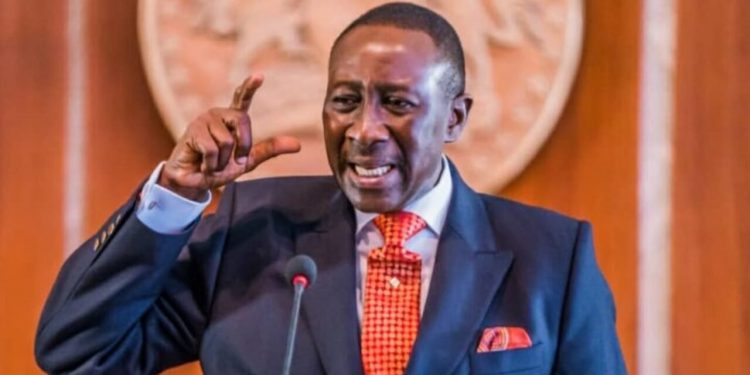The Federal Government has uncovered about 54,000 fraudulent payroll entries in its Integrated Personnel and Payroll Information System (IPPIS) through the whistle-blowing policy.
BASIC FACTS
- 54,000 false entries have uncovered in Integrated Personnel and Payroll Information System (IPPIS)
- The discovery was made possible through a whistle blower, indicating a possible viability of the whistle-blowing policy of the federal government.
- This was disclosed by the National Security Adviser (NSA), who also said that the use Bank Verification Number (BVN) aided in uncovering the fraud.
WHAT WE KNOW
The Federal Government on Friday said it uncovered 54,000 fraudulent payroll entries in the much praised Integrated Personnel and Payroll Information System (IPPIS).
Mr Babagana Monguno, who is the National Security Adviser (NSA) disclosed this at the National Policy Dialogue on Corruption and Security organised by the Independent Corrupt Practices and Other Related Offences Commission (ICPC) on Friday in Abuja.
He attributed the discovery to the expansion of the coverage of IPPIS against stiff opposition from some quarters.
Monguno also said the deployment of the Bank Verification Number (BVN) to validate the federal Government’s stance on the payment platform helped in the detection.
He said the implementation of the Treasury Single Account (TSA) in more than 90 per cent of all Ministries, Departments and Agencies (MDAs) of the government has resulted in the consolidation of more than 70,000 bank accounts previously spread across deposit money banks in the country, leading to the monthly saving of about N4 billion in bank charges.
The event was convened to discuss the current security challenges and how corruption is fueling the problems in the country.
Also in attendance were the President of the Senate, Ahmed Lawan; the Chief of Defence Staff, General Lucky Irabor, and the Minister of Interior, Rauf Aregbesola, among others.
COMMENTARY
Recall that the Federal Government had upon inception of the Mohammed Buhari’s government implemented the IPPIS and TSA as a means to graft, especially in government ministries, parastals and (Ministry Departments and Agencies) MDAs.
However, the implementation was not immediately welcomed by all. Some of the reason institutions like hospitals argued against was the bureaucracy that would hinder quick dispensation of services, especially in purchase of daily hospital consumables.
Also ASUU and other university unions had argued against their inclusion in IPPIS as it would negate the somewhat independence of the universities and a roll back to quest for autonomy.
IPPIS is one of the contentious issues in the ongoing ASUU strike. Nonetheless, the government seems ready to make a U-turn on it.
This discovery is a pointer that IPPIS is not water tight as the government would want many to believe. This has earlier been proved as government compared IPPIS with UTAS that was developed by ASUU.
It is good government has made this discovery and made it public. However, a step forward, should be to prosecute those that have benefited from this fraud or who sought to benefit from it.












